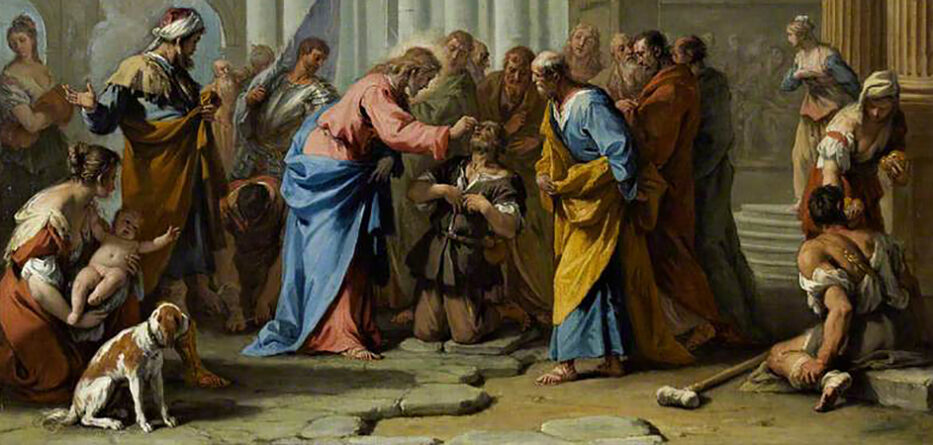Homily for the Fourth Sunday of Lent (Laetare Sunday)
Readings: 1 Samuel 16:1, 6-7, 10-13; Psalm 22(23); Ephesians 5:8-14; John 9:1-41
19 March 2023
With Jesus having fallen out of popular favour, the emeritus professor of sociology John Carroll has just published a book The Saviour Syndrome: Searching for Hope and Meaning in an Age of Unbelief. Carroll asks: “What can replace religion? Who do we look up to now?” Carroll is convinced that all of us, whether we be religious or not, are saviour-seeking, a saviour being “one who has discovered the key to the good life and uncovered truths that matter”. Saviours “are able to lead and to teach”.
LISTEN: https://soundcloud.com/frank-brennan-6/homily-19323
In today’s gospel from John, we encounter Jesus, a saviour in every sense of the word. Jesus and his disciples encounter a beggar who has been blind since birth. The disciples ask who sinned – the man or his parents? Jesus answers: neither. The beggar asks nothing of Jesus. But Jesus approaches him. Jesus makes a paste and puts it on his eyes and tells him to go and wash. The man washes and his sight is restored. It’s the Sabbath so according to the religious authorities both of them have sinned. The beggar claims no religious authority or insight. He just knows that he has been cured. The beggar moves from having his physical sight restored to being able to see the full reality culminating in his worshipping declaration to Jesus: “Lord I believe”. Meanwhile, the all-seeing, all-knowing religious authorities, tripped up on the legalities about the Sabbath and convinced that no one can come from God as did Moses, find themselves being blinded from the full reality of Jesus or being guilty of denying the reality they see. They’re either blind or foolish. The beggar can now see and is wise. As scripture scholar Raymond Brown puts it: “those who claim to see have become blind and those who are blind have come to sight”.
Brown says:[1]
“The blind man exemplifies one who is enlightened on the first encounter, but comes to see who Jesus really is only later – after undergoing trials and being cast out of the synagogue. This could be seen as a message to Johannine Christians who have had a similar experience, encouraging them that through their trials they have been given an opportunity to come to a much more profound faith than when they first encountered Christ.”
During the week, we have been treated to some superb recollections about Pope Francis who has chalked up ten years as pope. For many of us, and not just Catholics, Francis is something of a modern day saviour as described by John Carroll. Like the blind beggar, Francis has encountered Jesus’ healing touch and been liberated, breaking out of the constrictions of the religious authorities with hang-ups about the Sabbath and rejoicing in the presence of Jesus in the lives of people on the margins – present in a way that defies legalistic religious expectations.
Abraham Szorka who was chief rabbi in Argentina wrote in this week’s National Catholic Reporter: “Thirteen years ago, the then-cardinal archbishop of Buenos Aires and I began to ponder topics that were later presented in our book On Heaven and Earth. We had already enjoyed many lively dialogues, so we decided to render them into written form. I remember the moment I suggested that we might write a book about God. Jorge Mario Bergoglio’s reply was that we should instead write one about the things that challenge and confront the everyday lives of ordinary people. It instantly became clear to me that we both shared Jewish philosopher Martin Buber’s vision of the search for God: human beings can only approach God through our relationships with other people. We set no limits to our conversations. We simply expressed our ideas and beliefs while respecting and trying to deeply understand the ideas and feelings of the other. We spoke heart to heart.”[2]
In his introduction to their book On Heaven and Earth, Bergoglio, just before being elected pope, wrote: “With Rabbi Skorka I never had to compromise my Catholic identity, just like he never had to with his Jewish identity, and this was not only out of the respect that we have for each other, but also because of how we understand interreligious dialogue. The challenge consisted of walking the path of respect and affection, walking in the presence of God, and striving to be faultless.”[3]
Reflecting on his old friend with respect and affection, Skorka says, “Pope Francis sees life as a path upon which a person must walk with others….[H]is continuing challenge is to leave indelible footprints on the path he is walking that will guide all humanity to draw closer together and thereby seek the face of God (Psalm 27:8). That is the word to which he will be true.”
The beggar born blind and healed walks that path in today’s gospel. He shows us the way. Scripture scholar Brendan Byrne puts it well when he says: “What ultimately emerges, then, is a sense that faith far from being a flight into unreality and make-believe, actually entails a heightened capacity to see and accept the truth: the truth about oneself (including a sober recognition of one’s own proneness to self-deception and selfishness), the truth about the world and the truth about God’s outreach to the world in the person of the Son to draw human beings out of selfishness and delusion to the freedom of divine eternal life.”[4]
R: The Lord is my shepherd; there is nothing I shall want.
The LORD is my shepherd; I shall not want.
In verdant pastures he gives me repose;
beside restful waters he leads me;
he refreshes my soul.
R: The Lord is my shepherd; there is nothing I shall want.
He guides me in right paths
for his name’s sake.
Even though I walk in the dark valley
I fear no evil; for you are at my side
with your rod and your staff
that give me courage.
R: The Lord is my shepherd; there is nothing I shall want.
Fr Frank Brennan SJ is the Rector of Newman College, Melbourne, and the former CEO of Catholic Social Services Australia (CSSA). He was appointed a peritus at the Fifth Plenary Council of the Australian Catholic Church.
[1] Raymond E. Brown, An Introduction to the New Testament, Doubleday, 1997, p.348
[2] Abraham Szorka, ‘Francis: A pope who is true to his word, National Catholic Reporter, 14 March 2023, available at https://www.ncronline.org/vatican/francis-pope-who-true-his-word
[3] Jorge Bergolgio and Abraham Szorka, On Heaven and Earth, Image, New York, 2013, pp. xv-xvi
[4] Brendan Byrne, Life Abounding, St Pauls, 2014, p.169








